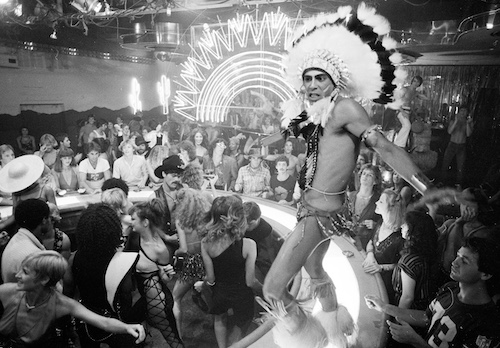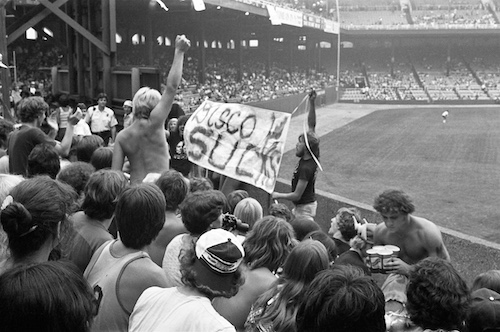Communiqué
Explore the cultural movement that gave rise to disco, and the backlash that tried to destroy it. “The War on Disco” on AMERICAN EXPERIENCE – Oct. 30 at 9
< < Back toAmerican Experience The War on Disco
Premieres Monday, October 30, 2023 on PBS and Streaming on PBS.org
Explore the Rise of Disco and the Backlash That Tried to Destroy It
The War on Disco, a new documentary produced by Lisa Q. Wolfinger and Rushmore DeNooyer, explores the culture war that erupted over the spectacular rise of disco music. Originating in underground Black and gay clubs, disco had unseated rock as America’s most popular music by the late 1970s, fueled in part by the 1977 film Saturday Night Fever, starring John Travolta.
But many diehard rock fans viewed disco as shallow and superficial. A story that’s about much more than music, The War On Disco explores how the powerful anti-disco backlash revealed a cultural divide that to some seemed to be driven by racism and homophobia. The hostility came to a head on July 12, 1979, when a riot broke out at “Disco Demolition Night” during a baseball game in Chicago. Executive produced by Cameo George, The War on Disco premieres on American Experience on Monday, October 30, 2023, 9:00-10:00 p.m. ET on PBS, PBS.org and the PBS App.

In the 1970s, disco began to dominate American popular music, taking over clubs, radio stations, and record sales. Its roots lay in the urban subculture, and the artists who created it were predominantly African American and Latino. In the gay dance clubs where it first flourished, disco was much more than music — it was an expression of pride.
Chicago DJ Steve Dahl played the music of AC/DC, Aerosmith, the Rolling Stones and other rock groups at WDAI Radio. On Christmas Eve 1978, he was told that the station was changing formats to disco and he was out of a job. Dahl was snapped up by a new radio station, WLUP, but feeling bitter and betrayed by WDAI, his anti-disco diatribes began and proved popular with audiences.
“Disco was about electronic music; disco fans liked the clubs where if you didn’t look good enough, you couldn’t get in,” said Lee Abrams, inventor of the “Album Oriented Rock” (AOR) radio format. “Rockers loved big concerts, real drummers, real guitar players — rock was about jeans and a T-shirt. . . Rockers were just angry at disco because they felt sort of threatened by it.”
In 1979, Chicago’s White Sox were the second-worst team in baseball. Hoping to draw crowds to a doubleheader at Comiskey Park, White Sox promotion director Mike Veeck partnered with WLUP to host “Disco Demolition Night” on Thursday, July 12, 1979. The price of admission was ninety-eight cents — WLUP’s frequency — and one disco record to be blown up by DJ Dahl between games.
Event organizers expected to draw an extra 5,000 people. Fifty thousand showed up, with another 20,000 waiting outside to get in. After the large crate filled with records exploded and blew a large hole in the field, the crowd started running out of the stands, tearing up bases and destroying the batting cage; others threw albums from the stands, hitting and injuring people. Police were called to clear the field, and ultimately, the White Sox had to forfeit the second game to the Detroit Tigers.

While everyone recognized that the promotion had gone terribly wrong, some saw something more frightening in the hordes of rampaging — almost entirely white — youth on the field: homophobia and racism. “It felt racist,” said Darlene Jackson. “I don’t think you could have a stadium full of, you know, Black and brown kids that would be allowed just to run uncontained, loose, damaging property.”
“What I would never want to do is villainize Steve Dahl for the ultimate outcome 100%,” said Ayana Contreras, host of “Reclaimed Soul” on WBEZ and contributor to Downbeat Magazine. “Yes, you had a perfect storm of disenfranchised youth and alcohol. But I don’t think he intended for a riot to happen. I think the ultimate point was it was ‘the other’ — that’s what they were rallying against — the people who were not like themselves.”
Some believed disco music was already on the wane and it declined sharply after the event. “The evening at Comiskey Park was the moment that set the fuse,” said Felipe Rose of the iconic disco group The Village People. “Suddenly, radio stations stopped playing disco music — not slowly, overnight.”
“All of American history is defined by culture wars,” said Jefferson Cowie, Vanderbilt University Professor of History and author of Stayin’ Alive: The 1970s and the Last Days of the Working Class. “But in the 1970s, an entire new front opened up in the battle over the culture. The Civil Rights movement, the women’s movement, the gay rights movement come along and say, ‘Hey, we want in too.’ And that’s why the 1970s are the foundation of our own time because we’re still battling over these same questions.”
American Experience The War on Disco will stream for free simultaneously with broadcast through November 29, 2023, on all station-branded PBS platforms, including PBS.org and the PBS App, available on iOS, Android, Roku, Apple TV, Amazon Fire TV, Android TV, Samsung Smart TV, Chromecast and VIZIO. The film will also be available for streaming with closed captioning in English and Spanish.

